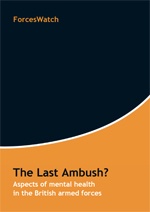The Last Ambush? Aspects of mental health in the British armed forces

Author: David Gee
Post-war mental health problems are most common in young soldiers from disadvantaged backgrounds; also in veterans who left the forces in the last decade.
This report from ForcesWatch, shows that young soldiers recruited from disadvantaged backgrounds are substantially more likely than other troops to return from war experiencing problems with their mental health.
The report, The Last Ambush? Aspects of mental health in the British armed forces, draws on over 150 sources, including 41 British military mental health studies, as well as testimony from veterans. It includes testimony from veterans and discusses in depth:
- how and why some veterans experience mental health problems
- the limitations of mental health research in military groups
- the role of adolescent maturity and childhood adversity
- the role of military culture, structures and operations
- the role of social and structural support after leaving the armed forces
- why raising the minimum age of recruitment to 18 would better serve the interests of young people in respect of mental health risks
It shows that,
- compared with older personnel, younger recruits are significantly more likely to suffer post-traumatic stress disorder (PTSD), to drink at levels harmful to health, and to behave violently on their return from war.
- young recruits from disadvantaged backgrounds are at greatest risk. They are more vulnerable to stress, more likely to be given jobs that are more exposed to traumatically stressful events on the battlefield, and more likely to lack strong social support when they leave the forces in order to manage the effects of a mental health problem they may be experiencing
- mental health problems are also alarmingly common among war veterans who left the forces since 2003.
Poverty plays a role in determining mental health risks in the forces, the report reveals. Compared with other recruits, those enlisting at a young age from disadvantaged backgrounds are more vulnerable to stress, more likely to be given jobs that are more exposed to traumatically stressful events on the battlefield, and more likely to lack strong social support when they leave the forces in order to manage the effects of a mental health problem they may be experiencing.
The report calls for the policy of recruiting from age 16 to be reviewed so that the greatest burden of risk is not left to the youngest, most vulnerable recruits to shoulder. Raising the minimum age of recruitment to 18 would ensure that recruits share the risks more equally and that they assume them at the age of adult responsibility. The report notes that the UK is the only state in the European Union to recruit from age 16 and one of only 19 worldwide; most state armed forces now recruit only adults.
In conclusion, the report considers that,
“Veterans’ trauma proceeds from the crucible of war, in which extreme violence leads to substantial numbers of psychologically wounded people. Many will live with this insidious legacy of warfare for the rest of their lives. The scourge is war itself. We as a society must realise that we cannot support wars without also condoning the traumatisation of combatants and civilians alike. We can choose health or war, but not both.”
Download the full report (PDF 1294kb)
Download the Executive Summary (PDF 268kb)
Read the press release: War trauma hits young soldiers hardest: new report
